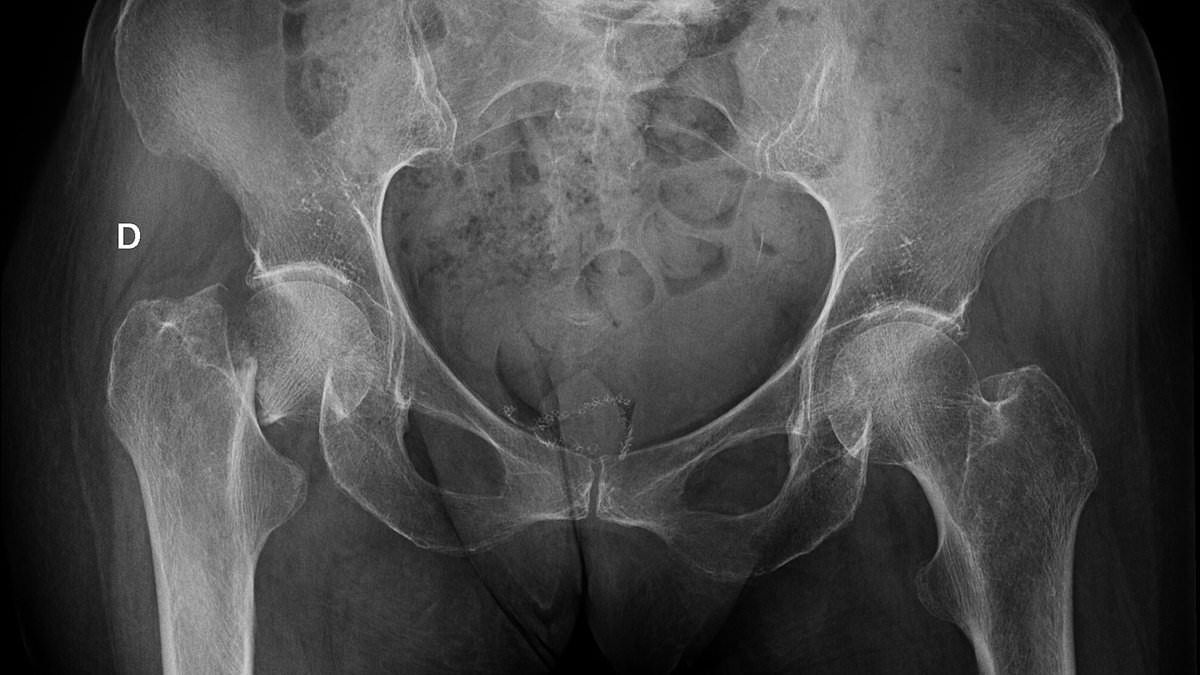One of the most commonly prescribed drugs in the US might put users at a higher risk of an agonizing bone disease, according to new research.
About 23 million Americans take levothyroxine, sold as Synthroid, each day, making it one of the five most widely used medications in the country.
It is a synthetic hormone prescribed to people with problems with their thyroid, the gland which helps control energy, weight and hair growth.
But researchers found that patients who take the drug suffer bone loss at a greater rate than their peers of similar weight, height and health.
The study only looked at older adults who are at the highest risk of the negative effects of frail bones, known as osteoporosis, which makes them frail and vulnerable to falls.
But the researchers from John Hopkins University said adults of all ages taking the drug should discuss the risks with their doctors.
They warned that many patients take Synthroid for so long that it’s no longer clear why it was prescribed to begin with or even if it is still needed.
Professor Shadpour Demehri, an expert in radiology at John Hopkins University in Maryland and study co-author said: ‘Our study suggests that even when following current guidelines, levothyroxine use appears to be associated with greater bone loss in older adults.’

Levothyroxine, pills that cost just a few pence a day to combat the condition, could raise the risk of losing bone mass and bone density

The thyroid is a gland in the neck that releases chemicals that control metabolism and energy
The research will be presented in full at the Radiological Society of North America's annual meeting next week in Chicago.
In the study, researchers assessed 81 patients on levothyroxine and 364 non-users.
Participants had an average age of 73 and an average thyroid-stimulating hormone level of 2.35. Normal levels are typically 0.4 to 4.0 milliunits per liter (mU/L).
Over a follow-up of six years, they found those on levothyroxine suffered a 'greater loss of total body bone mass and bone density'.
Read More
Surprising way osteoporosis can make you feel sick, reveals DR SCURR

This was the case even among patients with 'normal' thyroid-stimulating hormone levels.
Dr Jennifer Mammen, study co-author and associate professor of endocrinology at Johns Hopkins, said adults taking levothyroxine should discuss their treatment with a medic and regularly monitor their thyroid function tests.
She said: 'A risk-benefit assessment should be conducted, weighing the strength of the indications for treatment against the potential adverse effects of levothyroxine in this population.'
This could also suggest that Synthroid is being over prescribed, Dr Elena Ghotbi, study lead author and postdoctoral research fellow at John Hopkins University said.
Dr Ghotbi said: 'Data indicates that a significant proportion of thyroid hormone prescriptions may be given to older adults without hypothyroidism.
This isn't the first paper to take a critical look at the drug.
According to 2023 research from Yale School of Medicine, about 90 percent of people who take the drug may not need it.
Dr Joe El-Khoury, a professor of laboratory medicine, who led the research said: 'Study after study has shown that there is greater risk when you overtreat with levothyroxine in patients who may not need it.'
The Johns Hopkins researchers didn't study osteoporosis specifically, but low bone density is precursor to this condition, which affects roughly 10million people over age 50.

This X-ray shows a female with a broken hip, which is one of the most debilitating breaks associated with osteoporosis, according to Yale. Thyroid problems are much more common in women than in men.
In osteoporosis, holes inside the bone widen and cause the outer walls of the bone to thin, becoming brittle and easily breakable.
Then, one someone has a small tumble, they can be at risk for major bone breaks - including hip fractures.
According to Yale School of Medicine, these hip fractures can cause someone to lose mobility, independence and have been linked to an earlier death.
Osteoporosis becomes much more common with age - but the odds of developing the condition increase if someone smokes, has a poor diet, has arthritis or bone cancer.
In addition, hormones play a role in bone health. This includes thyroid hormones, sex hormones like estrogen and testosterone and growth hormones like insulin.
Women are five to eight times more likely to develop thyroid problems than men.
It's unclear what causes these disorders, but if they go untreated, they can cause heart disease and infertility, according to American Thyroid Association.
Researchers are unsure why thyroid hormones can cause these changes to bone. In a healthy body, scientists from the Imperial College London have shown that these hormones help control the rate that new bone replaces cartilage, the dense spongy centers of bone.
This helps maintain bone health, which includes regulating the rate that bone tissue is lost.
So, the theory is that if there is too much thyroid hormone in the body, the rate that bone tissue is lost outpaces the rate of new bone added, leading to osteoporosis.
Still, research is divided, and the Johns Hopkins team said more studies are needed to prove there is a link between the two.
